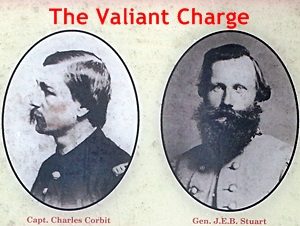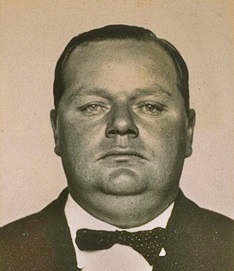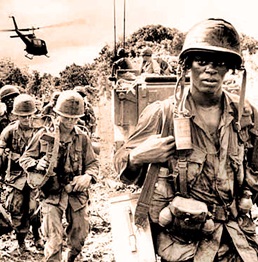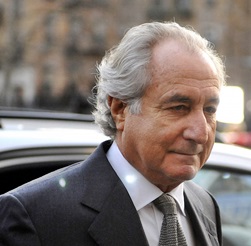June 29
“We are taught you must blame your father, your sisters, your brothers, the school, the teachers – but never blame yourself. It’s never your fault. But it’s always your fault, because if you wanted to change, you’re the one who has got to change.”
~Katharine Hepburn

1863 – Long forgotten, if indeed you ever knew this at all, a skirmish in the small town of Westminster, MD played a significant role in a major battle that would take place a few days later.
The Battle of Westminster (also known as Corbit’s Charge) erupted between two companies of the 1st Delaware Cavalry guarding the railroad tracks in Westminster and three brigades of Confederate General J.E.B. Stuart’s cavalry, which was charging its way through Maryland on the road to Gettysburg.
The Delaware cavalry companies had arrived the night before, unaware of Stuart’s impending approach. The next day, some of the Union troopers decided to have their horses reshod at a stable near the southern end of town. While there, the first Confederate cavalry arrived at the southern end of Westminster and captured the troopers.
Captain Charles Corbit, one of the company commanders, rallied the remaining troopers and led a cavalry charge down Main Street in Westminster towards Stuart’s cavalry.
Though thoroughly lacking in experience and vastly outnumbered, companies C and D of the Delaware regiment, about 100 men in all, rode to meet the head of the rebel column of 5000 horsemen.
They were quickly defeated by the Confederates, even though the local Postmaster said Corbit’s men had fought with “almost suicidal bravery.” Captain Corbit was captured, along with more than half of the other Union troopers.
The battle – short though it may have been – prompted Stuart’s cavalry to spend the night in Westminster, delaying his arrival at Gettysburg and depriving Gen. Robert E. Lee of important intelligence about Union troop movements and leading him to commit to fighting at Gettysburg.
The story continues tomorrow.

1933 – Actor and comedian Roscoe “Fatty” Arbuckle suffered a heart attack and died at the age of 46.
One of the most popular silent film stars (and one of the highest paid actors in Hollywood), Arbuckle starred in A Noise From The Deep, In The Clutches of The Gang and The Rough House, but that is not why he’s included in this article.
Between November 1921 and April 1922, Arbuckle was the defendant in three widely publicized trials for the rape and manslaughter of actress Virginia Rappe. She had fallen ill at a party hosted by Arbuckle at the St. Francis Hotel in San Francisco in September 1921, and died four days later.
Arbuckle was accused of raping and accidentally killing Rappe. After the first two trials, which resulted in hung juries, Arbuckle was acquitted in the third trial.
Despite Arbuckle’s acquittal, the scandal has mostly overshadowed his legacy as a pioneering comedian. Following the trials, his films were banned and he was publicly ostracized.

1970 – U.S. ground combat troops ended two months of operations in Cambodia and returned to South Vietnam. Military officials reported 354 Americans had been killed and 1,689 were wounded in the operation.
The limited “incursion” into Cambodia to clear North Vietnamese sanctuaries 20 miles inside the Cambodian border had given the antiwar movement in the United States a new rallying point.
Waves of anti war demonstrations spread across the U.S., including one at Kent State University that resulted in the killing of four students by Army National Guard troops, and another at Jackson State in Mississippi resulting in the shooting of two students when police opened fire on a women’s dormitory.
The incursion also angered many in Congress, who felt that President Richard Nixon was illegally widening the scope of the war; this resulted in a series of congressional resolutions and legislative initiatives that would severely limit the executive power of the president.

1975 – Musician Tim Buckley died from a heroin overdose at the age of 28.
Gifted with an impressive, multi-octave voice, Buckley began his career based in folk music (I Never Asked To Be Your Mountain), but his subsequent albums experimented with jazz, psychedelia, funk, soul, and avant-garde.
Richard Keeling, a longtime friend of Buckley, was arraigned on charges of second degree murder for furnishing Buckley with the drugs that caused his death. He pleaded guilty to involuntary manslaughter and was sentenced to 120 days in jail and four years of probation.
Buckley’s biological son, Jeff Buckley, who met his father only once, at the age of eight, later became a singer/songwriter best known for his stirring rendition of Leonard Cohen’s Hallelujah.
Jeff also died tragically, drowning at the age of 30.

1977 – Actress Jayne Mansfield was killed instantly when the car in which she was riding struck the rear of a tractor trailer on Interstate 90 east of New Orleans.
The truck was approaching a machine emitting a thick white fog used to spray mosquitoes when the Electra hit the truck from behind, killing Mansfield, driver Ron Harrison and lawyer Samuel Brody.
Her children; eight-year-old Mickey, six-year-old Zoltan and three-year-old Mariska, were sleeping in the back seat. They were injured but survived.
While Mansfield’s screen career amounted to about a dozen less-than-memorable films – most notably The Wayward Bus and Promises! Promises! – she played the movie star role to perfection and became one of the most visible glamour girls of the era.
One more thing … She was not, as the popular myth claims, decapitated.

1978 – Actor Bob Crane, best known for the role of Colonel Robert E. Hogan in Hogan’s Heroes from 1965-1971, was bludgeoned to death in his Scottsdale, AZ apartment. He was 49.
Crane – acting in dinner theater shows after his television career had stalled – was living in the Winfield Place Apartments in Scottsdale, Arizona, during a run of Beginner’s Luck at the Windmill Dinner Theatre.
On the afternoon of June 29, Crane’s co-star, Victoria Ann Berry, entered his apartment after he failed to show up for a lunch meeting and discovered his body.
The left side of his head had been crushed while he slept; the weapon was never identified, though investigators believed it to be a camera tripod.
That tripod was important because it wasn’t the only thing officials found.
Inside the apartment, police also found cameras, video equipment, a makeshift photo lab and dozens of videos of Crane having sex with different women.
Investigators described it as his “hobby.” He had pursued it with technical assistance from a video whiz named John Carpenter, who had been introduced to Crane by Richard Dawson when both were starring in Hogan’s Heroes.
Carpenter was eventually tried for Crane’s murder, and although the blood type found in his car matched Crane’s, he was acquitted.
The murder of Bob Crane remains officially unsolved.

1995 – Actress Lana Turner died of cancer at the age of 74.
A leading actress in the 1940s and 50s, Turner starred in such films as Somewhere I’ll Find You, The Postman Always Rings Twice, Imitation of Life, and Peyton Place, which earned her an Academy Award nomination for Best Actress.
Turner (and her only child, Cheryl) gained a different type of notoriety in 1958, when Cheryl stabbed – and killed – her mother’s then-boyfriend, John Stompanato.
Cheryl said she was trying to protect her mother after violent threats by Stompanato. A judge ruled the incident justifiable homicide.

1995 – Space shuttle Atlantis and the Russian space station Mir docked, forming the largest man-made satellite ever to orbit the Earth.
The historic moment of cooperation between former rival space programs was also the 100th human space mission in American history.
To make the docking, Atlantis commander, Robert “Hoot” Gibson had to steer the 100-ton shuttle to within three inches of Mir at a closing rate of no more than one foot every 10 seconds.
NASA’s Shuttle-Mir program continued for 11 missions and was a crucial step towards the construction of the International Space Station now in orbit.

2002 – Singer/actress Rosemary Clooney died of lung cancer at the age of 74.
She is best remembered for her 1951 novelty hit Come On-a My House, which was followed by other pop numbers such as Mambo Italiano, Hey There and This Ole House.
As an actress, she appeared in several musical comedies but her most memorable performance came in White Christmas, in which she co-starred with Bing Crosby and Danny Kaye.

2003 – Actress Katharine Hepburn, a four-time Academy Award winner for Best Actress and one of the greatest screen legends of Hollywood’s golden era, died of natural causes at the age of 96.
Nominated for 12 Academy Awards in her lifetime, Hepburn won for her performances in Morning Glory, Guess Who’s Coming To Dinner, A Lion In Winter, and On Golden Pond.
In 1999, the American Film Institute named Hepburn as the greatest female actress in the history of American cinema.

2009 – Financier Bernard Madoff received a 150-year sentence for his multibillion-dollar fraud.
Three months earlier, Madoff had pleaded guilty to 11 federal felonies, including securities fraud, wire fraud, mail fraud, money laundering, making false statements, perjury, theft from an employee benefit plan, and making false filings with the SEC.
The plea was the response to a criminal complaint filed two days earlier, which stated that over the past 20 years, Madoff had defrauded his clients of almost $65 billion in the largest Ponzi scheme in history.
Compiled by Ray Lemire ©2023 RayLemire.com. / Streamingoldies.com. All Rights Reserved.